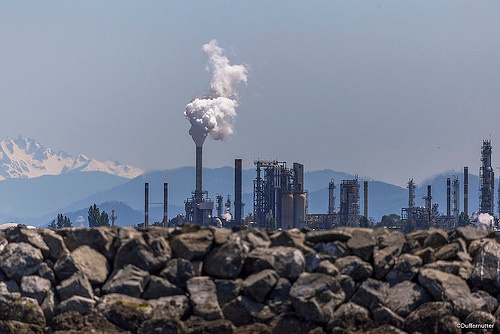In September 2025, California extended and amended authority for its statewide greenhouse gas (GHG) “cap and trade” program through 2045 – and rebranded it as “cap and invest.” The California Air Resources Board (ARB) has administered this program since 2012, as part of broader GHG reduction provisions created by 2006’s Assembly Bill (AB) 32. AB 32 initially committed the state to reduce total GHG emissions back to 1990 levels by 2020 (achieved in 2018); ARB’s latest GHG reduction scoping plan (issued in 2022), seeks to reduce statewide emissions to 85% below 1990 levels by 2045, achieving carbon neutrality. Subsequent legislation extended implementing authority for cap-and-trade and other related programs available to the California Air Resources Board (ARB) and other agencies through 2030. (I wrote about that extension (AB 398) HERE ). The newest legislation (AB 2017 and Senate Bill (SB) 840) continues the state’s GHG reduction efforts by making further changes to ARB’s cap and trade authority. The rest of this note summarizes these changes.
Read MoreAudit, Compliance and Risk Blog
California Extends and Amends its Greenhouse Gas Cap and Trade Program
Posted by Jon Elliott on Fri, Oct 17, 2025
Tags: climate change, sustainability, cap-and-trade, California, Climate, Carbon markets, Environmental Compliance, Climate Risk, California Regulations, Greenhouse Gas Emissions, GHG Reduction, cap-and-invest, California Air Resources Board
Environment and Climate Change Canada publishes Phase 1 reporting guidelines for Federal Plastics Registry
Posted by Jon Elliott on Mon, Feb 24, 2025
Canada has established a goal of zero plastic waste by 2030, and has established a variety of regulatory and informational programs to pursue that goal. As part of these effort, Environment and Climate Change Canada (ECCC) has established the Federal Plastics Registry (FPR), along with accompanying regulations requiring reporting by targeted producers of plastic packaging, electronic and electrical equipment, and single-use or disposable products. These entities’ reporting requirements expand annually in three “phases,” beginning with Phase 1 reports starting with selected 2024 data due by September 29, 2025. (I wrote about ECCC’s proposal to establish the FPR, HERE). The remainder of this note summarizes Phase 1 requirements and identifies Phase 2-4 targets.
Read More
Tags: Environmental risks, Environmental, climate change, Environmental Projects, Environment, Environmental Policy, Climate, plastics, Environmental Compliance, Plastic Waste
During 2024, at least five states considered legislation to enact “Climate Superfund” laws targeting fossil fuel companies, applying “polluter pays” principles enshrined in the US federal Superfund law (Comprehensive Environmental Response, Compensation and Liability Act (CERCLA of 1980) and its many state counterparts. At least two states enacted such laws – Vermont and New York. The rest of this note provides brief summaries of these laws.
Read MoreTags: Environmental risks, Environmental, Greenhouse Gas, climate change, Environmental Projects, Environment, Environmental Policy, Climate, environmental law, environmental protection, Environmental Compliance
In July, the US Environmental Protection Agency (EPA) issued the fifth edition of its periodic Climate Change Indicators report, focusing on Indicators related to the human health and societal impacts of climate change. While this 96-page report provides broad policy discussions, it applies data which calibrate ongoing changes that organizations can use to support evaluations of the possible impacts of these changes on their ongoing activities and future prospects. The remainder of this note summarizes EPA’s latest indicators, and how they can be relevant to organizational planning and decision-making.
Read MoreTags: Environmental, EPA, climate change, Environment, Environmental Policy, Climate, environmental protection
SEC adopts climate-related disclosure requirements for public companies
Posted by Jon Elliott on Tue, Mar 26, 2024
On March 6, 2024 the US Securities and Exchange Commission (SEC) announced new requirements that selected “public companies” (i.e, listed on national securities exchanges) provide “climate-related disclosures for investors” in their registration statements and annual reports. SEC is incorporating them into existing requirements to disclose “material information,” under the Securities Act of 1933 and the Securities Exchange Act of 1934. These new requirements are more limited than those proposed by SEC in March 2022 (which I wrote about HERE). The remainder of this note summarizes SEC’s new requirements.
Read More
Tags: SEC, Environmental risks, Environmental, climate change, Environment, Climate
Canada: Federal Court rejects listing of Plastic Manufactured Items as “Toxic Substances” under Canadian Environmental Protection Act
Posted by Jon Elliott on Mon, Feb 19, 2024
Among its many provisions, the Canadian Environmental Protection Act (CEPA) creates several lists of “toxic substances,” and empowers Environment and Climate Change Canada (ECCC) to revise the list. In 2021, ECCC add “plastic manufactured items (PMI)” to one of these lists, but was sued by manufacturers seeking to void the addition. Extensive CEPA amendments were enacted in April 2023 (“Strengthening Environmental Protection for a Healthier Canada Act” (Bill S-5)), including revisions to the toxic substance lists – including recodification of the listing of PMI – and left ECCC’s authority over toxic substances relatively unchanged, so the litigation continued. In November 2023, the Federal Court ruled that the CEPA amendments did not moot the issues in the litigation, and ruled that ECCC had exceeded its statutory and constitutional authority when listing PMI.
Read MoreTags: Environmental risks, Environmental, Greenhouse Gas, climate change, Environment, Environmental Policy, Climate, ECCC, CEPA
The US had been a major player in the drafting and enactment of the Kigali Amendment (during President Obama’s administration), but then withdrew its support (during President Trump’s administration). However, the US enacted Kigali-like requirements in the December 2020 coronavirus relief bill (American Innovation and Manufacturing Act of 2020 (AIM Act)), among the many provisions buried within its 5,593 pages; EPA finalized its rules in September 2021 (I wrote about these rules here).
The remainder of this note summarizes the situation.
Why are HFCs being phased down, and how?
HFCs were developed primarily as substitutes for chlorofluorocarbons (CFCs), which are the principal ozone depleting substances (ODSs) targeted by the Montreal Protocol. HFCs have lower but non-zero ozone depleting potential, and are greenhouse gases that contribute to climate change. Accordingly, nearly 30 years after the initial 1987 approval of the Montreal Protocol roughly 200 national and international parties negotiated HFC phase-downs. As adopted in Kigali, Rwanda these amendments divide countries into three groups with different schedules and targets:- developed nations including the United States – cut consumption to 90% of 2011-2013 baseline of most HFCs (plus 15% of those already covered by the Protocol) by 2019, declining to 15% by 2036
- most developing nations, including China and over 100 others - consumption to peak in 2024 at 100% of 2011-2013 baseline of most HFCs (plus 25% of those already covered by the Protocol), declining to 20% by 2045
- 10 hot-climate developing countries (where air conditioning is particularly important), including India, Pakistan and some Gulf states - consumption to peak in 2028 at 100% of 2011-2013 baseline of most HFCs (plus 25% of those already covered by the Protocol), declining to 15% by 2047
After the Trump administration replaced the Obama administration, the US took no action on this agreement. During this period, however, other countries have moved forward to ratify and work to meet their commitments.
What HFC-related provisions did the AIM Act enact?
The massive coronavirus relief bill includes Division S (“Innovation for the Environment”), with section 103 (“American Innovation and Manufacturing Act of 2020”). Without mentioning the Kigali Amendment, section 103 incorporates its requirements into US law:- the legislation lists 18 specific HFCs, and authorizes EPA to designate additional formulations
- EPA was to calculate 2011-2013 production and consumption baselines for each, and to use these to calculate future phase-down levels ranging from 90% in 2020 to 15% in 2036 and thereafter
- EPA was to issue regulations with 270 days (by 9/23/21) to set phase-down requirements, with associated procedural requirements including allowances associated with each baseline amount, and reclamation and destruction methods
EPA’s rules are designed to meet these requirements. In addition, EPA has initiated or re-invigorated other programs to support the phase-down of HFCs and their replacement by refrigerants that are less harmful to global climate and the stratospheric ozone layer.
What now?
Ratification will become official once the US submits formal notification to the United Nations. The new rules took effect on November 4, 2021 and are progressing; EPA proposed 2024-reduction formulas on October 20, 2022.. While domestic requirements will not change from those enacted through the AIM Act, ratification returns the US to the center of international HFC-reduction efforts, and reinforces national commitments to the environment.IImplementation Checklist
- Does the organization manufacture, import or use any ozone depleting substance (ODS) subject to the Montreal Protocol and/or CAA Title VI?
- If the phase-out date for any ODS has passed, do any of the organization’s activities qualify with applicable exceptions or essential uses?
- Does the organization manufacture, import or use any HFCs?
- Has the organization reviewed any such activity to identify alternatives for any HFC that is or may become subject to phase-down under US and international law?
Where do I go for more information?
Information available via the Internet includes:
● US legislation
Tags: Environmental risks, Greenhouse Gas, climate change, Environment, HFCs, Ozone Layer, Environmental Policy, Climate
Canadian securities administrators propose climate-related disclosure requirements for public companies
Posted by Jon Elliott on Mon, Aug 22, 2022
When must organizations evaluate and disclose how climate change will affect their operations?
The Canadian Securities Administrators (CSA) provides a cooperative forum for Canada’s provincial and territorial securities regulators, including the development of model regulations and associated guidance. Last October, CSA took its latest step toward climate-related disclosure requirements, by proposing “National Instrument 51-107 – Disclosure of Climate-related Matters;” public comments were due by January 17, 2022. Assuming CSA moves ahead and finalizes this National instrument (NI), then securities regulators throughout Canada will enact equivalent requirements and establish compliance deadlines for companies they regulate.
Read More
Tags: climate change, Environment, Canada, Climate
EPA proposes to require worst case release planning by onshore facilities
Posted by Jon Elliott on Mon, Apr 25, 2022
On March 28, the US Environmental Protection Agency (EPA) proposed regulations requiring “non-transportation-related onshore facilities” to prepare response plans covering possible releases of hazardous substances, and submit those plans to EPA. This proposal implements longstanding but unused EPA authority under the Clean Water Act (CWA). The remainder of this note discusses the proposal.
Read More
Tags: EPA, climate change, Environment, Climate
Biden Administration again proposes to expand EPA’s budget significantly
Posted by Jon Elliott on Mon, Apr 18, 2022
On March 28, the Biden Administration issued its budget proposal for federal Fiscal Year (FY) 2023 (October 1, 2022 through September 30, 2023). The administration proposes a $11.9 billion budget for the Environmental Protection Agency (EPA), a 29% ($2.6 billion) increase above EPA’s adopted 2022 budget of $9.6 billion – similar to the administration’s FY 2022 proposal of $11.2 billion (which I wrote about HERE), which Congress cut considerably.
Read More
Tags: EPA, climate change, Environment, Climate










